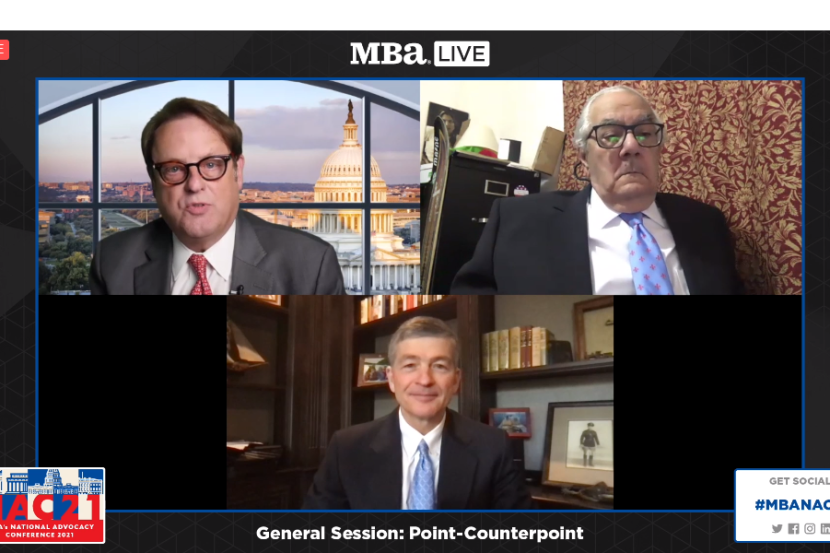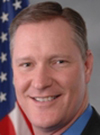
#MBANAC21: The View From The House

(Clockwise from top left: MBA Senior Vice President Bill Killmer, former Rep. Barney Frank, former Rep. Jeb Hensarling)
Three senior lawmakers–two retired, one retiring from Congress–stopped by MBA’s National Advocacy Conference yesterday to weigh in on housing, the economy and lessons learned.
Steve Stivers, R-Ohio, Ranking Member on the House Financial Services Committee, will retire from Congress this week to become President and CEO of the Ohio Chamber of Commerce. He said he is proud of his work in Congress promoting consumer choice, competitive markets and smart financial market regulation.

Stivers helped the SAFE Transitional License Act become law. “I was hearing a lot about mortgage licensing,” he said. “We have about 75,000 financial services professionals in our area and I kept hearing from my constituents that they were having real trouble transitioning from one job to another because of the different licensing requirements, so I started working on the issue. I worked a lot with MBA because your members are the ones having those problems.”
The law, which amended the SAFE Act, allows mortgage loan originators transitioning between federally insured depositories and non-depositories as well as across state lines to originate mortgage loans. It passed in 2018, “after a false start,” Stivers said. “We got it done and it feels really good to make a difference for people. To know that a person won’t be trapped in a job with an employer that doesn’t fit them. They can transition to somewhere that works for them. That makes a difference for their family and for the whole industry.” He called the SAFE Transitional License Act one of the legacies of his service in Congress.
Stivers also noted his Columbus, Ohio-area district has made “great leaps and bounds” in addressing a homelessness problem among military veterans. “We’ve gone to a situation in Columbus where veteran homelessness is essentially not a problem because we quickly shelter people and move them into long-term situations,” he said.
In a second general session, two former House Financial Services Committee Chairmen, former Rep. Barney Frank, D-Mass., and former Rep. Jeb Hensarling, R-Texas, debated the economy, inflation and the future.
Frank co-authored the Dodd-Frank Wall Street Reform and Consumer Protection Act, the regulatory overhaul signed into law in July 2010. He said federal government assistance helped the economy to weather the COVID-19 downturn. “We are a world leader in bouncing back from the pandemic,” he said. “It’s interesting, especially for this audience, that we are enjoying a very good economy with historically low interest rates.”
If inflation does start to appear, the Federal Reserve “has enormous power to hold things down,” Frank said. “When interest rates are as low as they are now, if the question is, ‘can the Fed step in and slow down inflation?’, the answer is yes, it can, with great effect, and without putting rates up to a choke level,” he said. “That’s a good sign.”
Hensarling agreed the economy is in a very good place, in large part due to the vaccines. “In addition, we had one of the most booming economies in my lifetime pre-COVID,” he said. “Typically, when you look at economic cycles, the deeper the trough the quicker the snap-back.”
But Hensarling said he sees much more inflation risk than Frank does. “Already in some commodity prices and various asset prices you are seeing inflation,” he said. “Not necessarily as the Fed chooses to measure it, but we’re seeing inflation rear its head today. Now, I don’t think we will see it manifest itself in a malignant way in the short term, but what’s different this time is that you have this flood of liquidity at the Fed because they’ve changed their monetary policy tool from open market operations to interest on excess reserves. As the economy begins to heat up, the Fed will have to raise interest rates to keep all the capital on reserve at the Fed from flooding into the economy.”
At that point, you would likely see either more inflation or greater interest rates, Hensarling said. “That’s going to be a very, very difficult thing for the Fed to challenge,” he said.
MBA’s National Advocacy Conference continues today.
